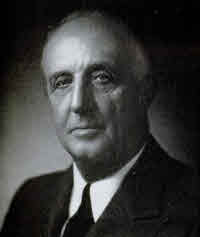Maybe the Brewers Should Hire a Lawyer as Their Next Manager
 The announcement that St. Louis Cardinal manager Tony LaRussa is retiring after his team’s victory in the 2011 World Series provides us with an opportunity to remind the non-lawyer world of the extraordinary success of lawyers who have served as managers in Major League baseball.
The announcement that St. Louis Cardinal manager Tony LaRussa is retiring after his team’s victory in the 2011 World Series provides us with an opportunity to remind the non-lawyer world of the extraordinary success of lawyers who have served as managers in Major League baseball.
LaRussa, who earned his law degree from Florida State in 1978, is one of only seven law school graduates and/or lawyers to manage in the major leagues. The other six were John Montgomery Ward, Hughie Jennings, Branch Rickey, Miller Huggins, Muddy Ruel, and Jack Hendricks. In addition, all seven played in the major leagues as players, though with varying degrees of success.
As a group, the seven were quite successful. LaRussa, who managed in the majors from 1979 to 2011, managed the second largest number of games in baseball history (second to Connie Mack who owned the team that he managed) and recorded the third greatest number of victories (behind Mack and non-lawyer John McGraw). Altogether, LaRussa’s teams won 14 division championships, six league titles (three in the National League and three in the American), and three World Series titles.
Miller Huggins, who managed the Cardinals and the Yankees from 1913 to 1929 (the year that he died), was almost as successful as LaRussa, winning six American League championships and three World Series. (Having Babe Ruth and Lou Gehrig on his Yankee teams may have had something to do with his success.) Huggins was a graduate of the University of Cincinnati Law School where one of his professors was future United States President and Chief Justice of the Supreme Court, William Howard Taft.
In contrast to LaRussa and Huggins, Branch Rickey managed in the major leagues from 1913-1915, and 1919-1925, with no particular success—his best teams finished 3rd in 1921 and 1922. However, as a club president and team general manager he was perhaps the most successful and most influential front office executive in baseball history. As the inventor of the farm system and the first baseball general manager to sign African-American players, his teams in St. Louis and Brooklyn won eight league championships and four World Series titles. Rickey was a graduate of the University of Michigan Law School, and as a law student, he supported himself by coaching the Michigan varsity baseball team.
Hughie Jennings, manager of the Detroit Tigers from 1907 to 1920, and of the New York Giants in 1924 and 1925, attended Cornell Law School, and while he left without graduating, he was subsequently admitted to the Maryland bar. Although Jennings was never able to lead the Tigers or the Giants to a championship, as a player he was the star shortstop on five National League championship teams in the 1890’s, and, notwithstanding his lack of titles, he was the winningest manager in Detroit Tiger history until he was passed by Sparky Anderson late in the 20th century.
John Montgomery Ward, who earned a law degree from Columbia while playing with the New York Giants in the 1880’s, was one of the premiere shortstops (and at the beginning of his career, pitchers) in nineteenth century baseball. He also managed a number of the teams that he played, serving as player-manager in 1880, 1884, and 1890-1894. Although Ward won championships as a player, none of the teams he managed ever finished at the top of the heap. However, his teams were usually quite respectable, and he did finish second four times in the seven years that he managed.
The only lawyer-managers that did not achieve great success as managers were Jack Hendricks and Herald “Muddy” Ruel. Hendricks, who received his law degree from Northwestern, managed the St. Louis Cardinals in 1918 (between stints by fellow lawyers Huggins and Rickey) and the Cincinnati Reds from 1924 to 1929. His best season came in 1926, when his Reds finished in 2nd place, behind the St. Louis Cardinals.
Muddy Ruel’s career as a major league catcher extended over a 19-year period during which he was widely regarded as one of the top defensive catchers in the game. However, his service as a manager was relatively brief, lasting only for one year, 1947, when he managed the St. Louis Browns to a last place finish. Although 1947, was his only year as a manager, he spent many years in the major as a coach, and he ended his career in baseball as the general manager of the Detroit Tigers in the mid-1950’s.
The success of the lawyer-managers has not gone unnoticed. Four of the seven lawyer-managers (Huggins, Rickey, Jennings, and Ward) are already in the baseball Hall-of-Fame, and Tony LaRussa will clearly join them once he becomes eligible for induction. (Technically, only Huggins was elected to the Hall as a manager; Rickey was chosen as an executive; and Ward and Jennings went in as players.) Jack Hendricks’s .496 winning percentage as a manager and .207 batting average in his two major league seasons translate into a 0.0% change of ever being elected to the Hall of Fame. Although Ruel was recognized as an outstanding defensive player who specialized in throwing out baserunners trying to steal, he seems unlikely to ever be elected to the Hall of Fame. While his career .275 batting average was quite respectable for a catcher who played from 1915 to 1934, his four home runs in 19 years hardly shout out “Hall of Fame,” even though he did finish in the top 11 in American League Most Valuable Player voting on three occasions
Given their lengthy careers in baseball, most of the lawyer-managers spent little time actually practicing law. There is little evidence that Rickey, Huggins, Jennings or LaRussa spent any significant amounts of time in the courtroom or the law office. However, after his playing days Ward went on to a long, successful career as a New York City lawyer, often representing figures in the sports industry. Hendricks apparently did the same, and also appears to have worked as a lawyer in the off-season during his playing career which was mostly spent in the minor leagues.
Although Ruel was the least successful manager of the lawyer-managers, the Washington University Law School graduate may well have been the best lawyer of the group. His legal acumen led Baseball Commissioner and former United States Senator Happy Chandler to appoint him as his chief assistant in 1946, and Ruel was apparently the only one of the seven lawyer-managers ever admitted to practice before the United States Supreme Court.
On a final note, it is interesting that five of the seven lawyer-managers managed in St. Louis, directing either the Cardinals (Huggins, Hendricks, LaRussa), or the Browns (Ruel), or both (Rickey). Apparently St. Louis is a good town for both baseball and lawyers.

 Carl Barnett Rix was never a full-time professor at the Marquette Law School, but he was a part-time instructor for almost 40 years (1908-1946). During that time he taught hundreds of Marquette law students while carrying on an active law practice and a professional life that led him to the presidencies of the Milwaukee Bar Association, the Wisconsin State Bar, and the American Bar Association.
Carl Barnett Rix was never a full-time professor at the Marquette Law School, but he was a part-time instructor for almost 40 years (1908-1946). During that time he taught hundreds of Marquette law students while carrying on an active law practice and a professional life that led him to the presidencies of the Milwaukee Bar Association, the Wisconsin State Bar, and the American Bar Association.